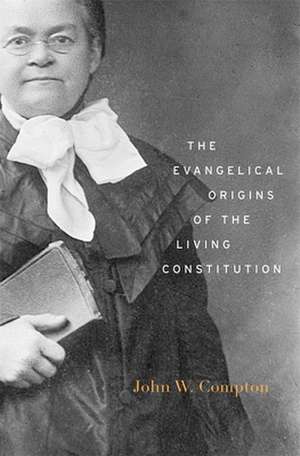The Evangelical Origins of the Living Constitution
Autor John W. Comptonen Limba Engleză Hardback – 13 mar 2014
Following the great religious revivals of the early 1800s, American evangelicals embarked on a crusade to eradicate immorality from national life by destroying the property that made it possible. Their cause represented a direct challenge to founding-era legal protections of sinful practices such as slavery, lottery gambling, and buying and selling liquor. Although evangelicals urged the judiciary to bend the rules of constitutional adjudication on behalf of moral reform, antebellum judges usually resisted their overtures. But after the Civil War, American jurists increasingly acquiesced in the destruction of property on moral grounds.
In the early twentieth century, Oliver Wendell Holmes and other critics of laissez-faire constitutionalism used the judiciary's acceptance of evangelical moral values to demonstrate that conceptions of property rights and federalism were fluid, socially constructed, and subject to modification by democratic majorities. The result was a progressive constitutional regime--rooted in evangelical Protestantism--that would hold sway for the rest of the twentieth century.
Preț: 428.27 lei
Nou
Puncte Express: 642
Preț estimativ în valută:
81.95€ • 85.79$ • 67.81£
81.95€ • 85.79$ • 67.81£
Carte tipărită la comandă
Livrare economică 07-21 aprilie
Preluare comenzi: 021 569.72.76
Specificații
ISBN-13: 9780674726796
ISBN-10: 0674726790
Pagini: 272
Dimensiuni: 164 x 235 x 27 mm
Greutate: 0.55 kg
Editura: Harvard University Press
ISBN-10: 0674726790
Pagini: 272
Dimensiuni: 164 x 235 x 27 mm
Greutate: 0.55 kg
Editura: Harvard University Press
Notă biografică
Descriere
John Compton shows how evangelicals, not New Deal reformers, paved the way for the most important constitutional developments of the twentieth century. Their early-1800s crusade to destroy property that made immorality possible challenged founding-era legal protections of slavery, lotteries, and liquor sales and opened the door to progressivism.















